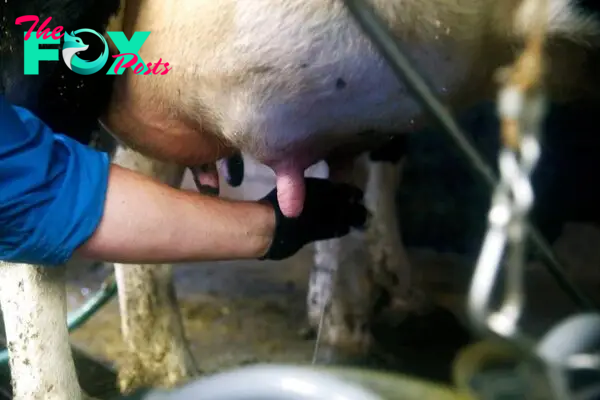Health
Colorado expands testing for bird flu at dairy farms as state hits 30 cases in 30 days
The Colorado Department of Agriculture this week stepped up efforts to stop a runaway outbreak of bird flu cases on dairy farms by issuing an order requiring testing for the virus on all commercial cow dairies licensed by the state.
But, separately, new information about the bird flu virus that infected a Colorado farmworker provides reassuring evidence that the virus remains a low risk to human health.
The state has seen at least 51 cases of bird flu on dairy farms since April, meaning nearly half of all commercial dairies in Colorado have been affected. Of those cases, 30 have happened in the past 30 days.
Colorado’s outbreak continues to surge even as others have dwindled nationwide — no other state has seen more than four cases in the past 30 days, and some major dairy-producing states like Wisconsin and California have never reported any cases.
In issuing the order, state veterinarian Dr. Maggie Baldwin said the virus, while not causing deaths of many cattle, has still been a devastating disruption to Colorado’s dairy industry — resulting in quarantines and loss of milk production.
“We have been navigating this challenging, novel outbreak of HPAI in dairy operations for nearly three months in Colorado and have not been able to curb the spread of disease at this point,” Baldwin said in a statement, using a shorthand term for the virus, which is also known as highly pathogenic avian iNFLuenza.
The order does not apply to farms that produce raw milk, which are not regulated by the state. Pasteurization kills the virus in milk sold in stores, but raw milk is unpasteurized, meaning there is the potential for it to contain live virus.
☀️ READ MORE
Extreme heat in Colorado may have contributed to an extraordinary outbreak of bird flu in people
Garlic from this Colorado farm is making neighbors give up grocery store bulbs for good
Colorado identifies three new human cases of bird flu and more people are symptomatic
Spillover cases
Baldwin noted that, as the dairy outbreaks rage on, they are also generating spillover cases in other animals. Most notably, Colorado has begun seeing infections again in commercial poultry operations.
There have been two major, confirmed outbreaks at egg-laying operations in Weld County, while a third, suspected outbreak is also under investigation. Those outbreaks have resulted in the culling of more than 3.2 million chickens just in July, according to the Department of Agriculture.
Colorado has now seen 33 commercial poultry flocks affected since 2022, with more than 6.3 million domestic birds culled.
Then there’s the human toll. One of those poultry outbreaks led to an unprecedented cluster of cases among workers who were doing the culling. Six workers were confirmed positive for bird flu, though their symptoms were relatively mild and none required hospitalization.
Meanwhile, the Colorado Department of Public Health and Environment announced over the weekend that it is investigating a new possible human case of bird flu — this one tied to culling operations at a different poultry farm. The federal Centers for Disease Control and Prevention will confirm whether the infection is bird flu.
Searching for genetic changes
If the new case is confirmed, the state has now identified nine out of the 12 human cases nationwide since 2022, placing Colorado at the center of the nation’s bird flu epidemic. And the burst of human infections in Colorado has raised questions about whether the flu virus has mutated to make it more capable of infecting people.

But a new CDC analysis eases those concerns. The CDC took a virus sample from one of the Colorado poultry workers and sequenced its genome.
Among the findings:
- The sample’s genetics are closely related to those of viruses found in animals from other recent outbreaks at poultry and dairy facilities. Among human cases, the Colorado worker’s virus is most similar to the virus that infected a dairy worker in Michigan earlier this year.
- The Colorado virus “maintains primarily avian genetic characteristics,” according to the CDC, meaning it isn’t especially adapted to infect people or spread person-to-person. It does, however, have one mutation that makes it better at infecting mammals. That mutation has been found in more than 99% of infections among cattle.
- There were no mutations found that indicate the virus is developing resistance to existing antiviral drugs.
- There are also no changes to the virus suggesting it is more capable of causing harm to humans.
- The virus is closely related to a couple bird flu samples available to vaccine manufacturers, meaning companies could start producing a bird flu vaccine quickly if needed.
So, to recap: Nothing about the Colorado case suggests the bird flu virus has become better able to infect people, hurt people or spread to other people. The CDC said the analysis “supports CDC’s conclusion that the human health risk currently remains low.”
No evidence of silent spread
The CDC also reported some more good news last week: Blood tests of Michigan dairy workers were boring.
Michigan’s public health department conducted what is known as a seroprevalence study of workers with known exposures to infected cows. The goal was to see if workers who showed no symptoms of bird flu actually had antibodies against the virus. If they did, it would suggest that they had been silently infected and that human cases might be more common than known.

Instead, the results from every nonsymptomatic worker tested came back clean — no antibodies against bird flu.
-

 Health2h ago
Health2h agoThe Surprising Benefits of Talking Out Loud to Yourself
-

 Health4h ago
Health4h agoDoctor’s bills often come with sticker shock for patients − but health insurance could be reinvented to provide costs upfront
-

 Health19h ago
Health19h agoWhat an HPV Diagnosis Really Means
-

 Health1d ago
Health1d agoThere’s an E. Coli Outbreak in Organic Carrots
-

 Health1d ago
Health1d agoCOVID-19’s Surprising Effect on Cancer
-

 Health2d ago
Health2d agoWhat to Know About How Lupus Affects Weight
-

 Health5d ago
Health5d agoPeople Aren’t Sure About Having Kids. She Helps Them Decide
-

 Health5d ago
Health5d agoFYI: People Don’t Like When You Abbreviate Texts


























